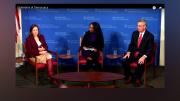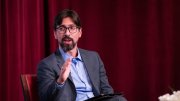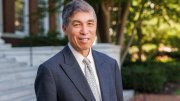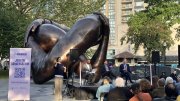“Secretary Raffensperger, you’ve had an interesting couple of years.” So began a conversation at the Institute of Politics (IOP) Tuesday evening with Georgia secretary of state Brad Raffensperger, who took the infamous phone call from Donald Trump after the 2020 election, demanding that he “find” enough votes to overturn Joe Biden’s victory in the state. Raffensperger’s conversation partner for the evening was Natalie Tennant, West Virginia secretary of state from 2009 to 2017 and a current IOP resident fellow, and the event, titled “Defenders of Democracy,” covered everything from voting restrictions and internet ballots to last week’s midterm elections, election-denialism, and the “independent state legislature theory” scheduled for oral arguments before the Supreme Court next month. Tennant and Raffensperger also discussed how the work of secretaries of state had become politicized in the wake of the 2020 election.
Moderator Abby Phillip ’10, a CNN political correspondent, was the first to broach the subject of Trump’s 2020 call and the 11,1780 votes he asked Raffensperger to find. The Georgia secretary of state gained national attention (and he and his family received death threats from far-right extremists) for defying the then-president’s pressure and defending the integrity of Georgia’s results. Last week, he won a second term in office. Noting Trump’s impending announcement of another run for the White House in 2024—which came a couple of hours later—Phillip asked Raffensperger, a Republican, “Would you vote for him again?” Raffensperger demurred (“We don’t endorse”), but the question came up repeatedly throughout the night. In the end, he all but confirmed he would not vote for Trump again, although he did not say so explicitly. (“I'm going to look for someone that has character, integrity, honesty, ability to engage in civil discourse—and speaks kindly,” he said.)
Tennant, a Democrat, who became secretary of state “back when it was boring,” as Phillip put it, spoke about her cautious optimism for democracy after this year’s midterms, in which several high-profile conspiracy theorists who deny the validity of the 2020 election were defeated in their campaigns for office (most notably, Nevada secretary of state candidate Jim Marchant and Arizona governor candidate Kari Lake, both of whom lost to their Democratic rivals). Still, Tennant cautioned, after the upheaval that followed the 2020 election, which ended in the January 6 insurrection at the Capitol, “We’re not going to administer elections like we used to anymore.” She compared the situation to air travel after 9/11, when officials made fundamental and permanent changes to airport security. Noting how smoothly the recent midterms seemed to go, she added, “The reason we didn’t see as much [of a] problem is that we were all prepared for it.” Thanks to communication and collaboration among election offices across the country, “Election officials were prepared for anything, because we’ve been listening, we’ve been paying attention.…And now it always has to be like that. We can’t breathe a sigh of relief, like, ‘Oh, man, we got this, we turned them back. We’re good.’ No. It always has to be this vigilance.”
During the question-and-answer session, several College and Kennedy School students from Georgia—including at least one disaffected former Republican—directed questions to Raffensperger. Many of the questions focused on the differences that have emerged, especially during the past two years, between Raffensperger and the rest of his party, over things like election-denialism and trust in elections, but also voter restrictions and absentee and mail-in ballots. (Earlier, Phillip had questioned Raffensperger about Republicans’ recent opposition to absentee voting, a change of position that seemed to coincide with Democrats increasingly voting absentee; Raffensperger answered that he “got a lot of blowback” in 2020 for sending out absentee ballots to every active registered voter). “When will the rest of your party come along?” one student asked.
Raffensperger’s response seemed to convey the difficulty of the situation, for him and for the country: “I don’t look for battles,” he said. “But I do believe that you’ve got to stand firm on the truth, and you have to have the courage to do so. I think that’s one of the ways of getting the country back on the right path.”
Canadian journalist and lawyer Omer Aziz, a current Radcliffe Fellow, asked Raffensperger whether he believed Trump to be “a fascist.” Raffensperger answered that, “I try to stay away from labels and pejoratives,” but “What I will say is that encouraging violence is always wrong.”
The last question of the night came from a Kennedy School student who researches election administration and asked Raffensperger about the challenge of communicating complicated ideas to voters during a disinformation age. “I’m curious as to your experiences of communicating truth and complexity in these election policies,” she asked, especially “when very often members of specifically your party have been averse to both?”
Raffensperger’s answer returned to a frequent theme: the importance of speaking directly to constituents—and, in his case, also to county-level election officials on the ground—and the importance of both listening and explaining. During the recent midterm election, he said, “We were out there talking, and really just having conversations and making sure we were always out there, doing press releases, talking to the counties, and making sure that also the counties understood the process and that we had a two-way street.” As the event wrapped up a couple of minutes later, he added, “What we all want is to make elections boring again.”









